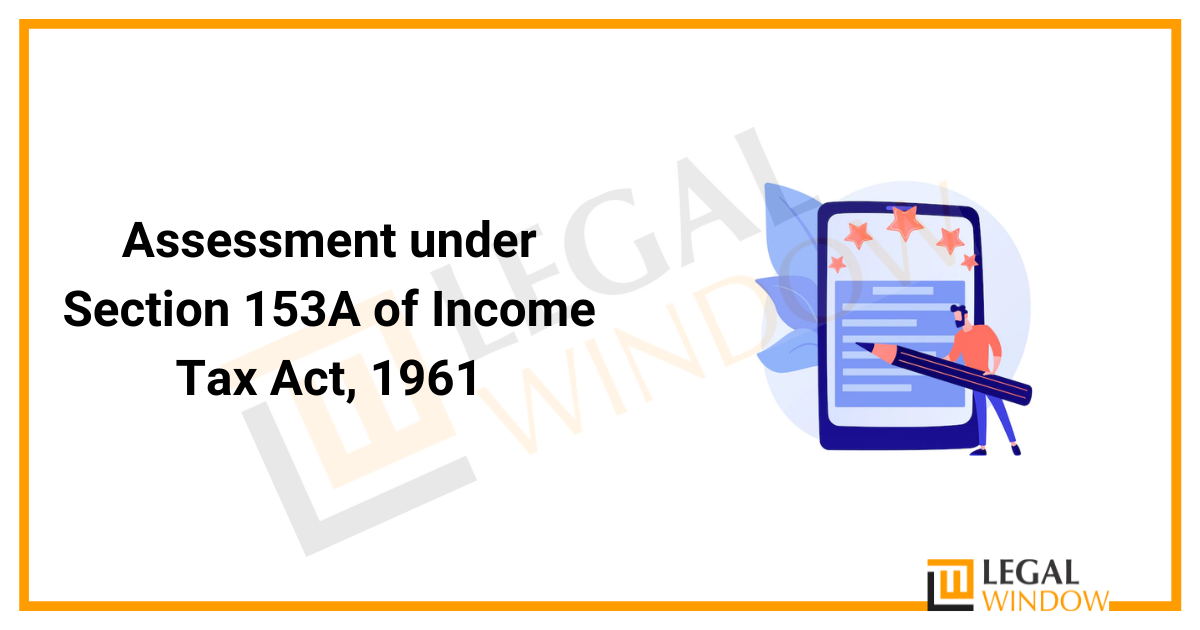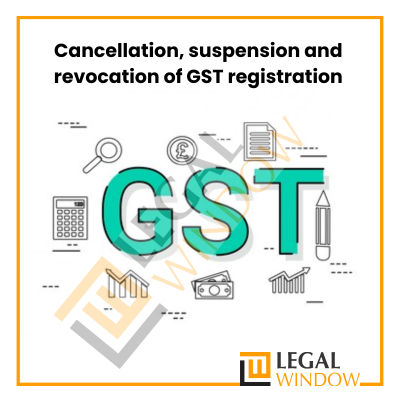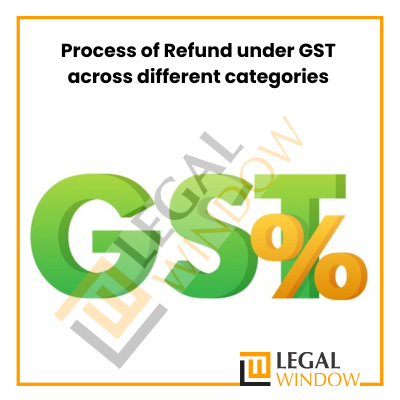
Section 153 A of the Income Tax Act, 1961 specifies the system for assessing income in the case of a searched person. In terms of the stated clause, the Assessing Officer might frame assessment of a searched individual for six assessment years immediately proceeding the year of search. One such aspect is whether, when framing assessments under the said section, the addition/disallowance, if any, with respect to the assessment year for which the proceedings do not abate (means there has either been assessment done previously or the time period for making such an assessment has elapsed), should be limited only to the ‘incriminating’ materials discovered during the course of search proceedings. In this article we’ll discuss Assessment under Section 153A of Income Tax Act, 1961.
Provision of Section 153 A under Income Tax Act 1961
Section 153 A of the Income Tax Act, 1961, specifies a process for determining income in the case of a searched individual. The Assessing Officer has the ability to define an individual’s assessment for the six assessment years immediately proceeding the year of search, according to the aforementioned clause.
Further, one such issue is whether, in framing the assessment under the said section, the addition/disallowance, if any, should be limited to the ‘incriminating’ materials discovered during the search proceedings for the assessment year for which the proceedings do not abate (that is, there has been prior assessment or the time period for making such an assessment has expired). Until now, the majority of judicial precedents noted below suggest that while constructing an assessment under section 153A of the Act, the Assessing Officer cannot make an addition or disallowance based on any ‘incriminating’ data.
Amendment of Section 153A under Income Tax Act 1961
Section 153A of the Income Tax Act, pertaining to search assessments, is changed to specify that a notice under the said section can be issued up to the 10th AY if:
- Assets are utilised to avoid paying taxes on income.
- The income tax exemption applies to that year, in whole or in part.
The AO possesses books of accounts, other records, or proof that the income that has escaped assessment amounts to or is projected to amount to Rs.50 lakh or more in a single year or in the aggregate in the relevant four AYs.
“Assessment in case of search or Requisition,” Section 153A of the Income Tax Act 1961
Despite anything in sections 139, 147, 148, 149, 151, and 153, if a search is commenced under section 132 or books of account, other papers, or any assets are requisitioned under section 132A after May 31, 2003, the Assessing Officer shall-
- Issue notice to such person requiring him to furnish the return of income in the prescribed form and verified in the prescribed manner for each assessment year falling within six assessment years and for the relevant assessment year or years referred to in clause (b), in the prescribed form and setting forth such other particulars as may be prescribed, within such period as may be specified in the notice, and the provisions of this Act shall, so far as may be, apply accordingly as if;
- Assess or reassess the total income of the six assessment years immediately before the relevant assessment year or years and for the relevant assessment year or years.
Further, the Assessing Officer must evaluate or review the total income for each of the six assessment years, as well as for the relevant assessment year or years. Moreover, assessment or reassessment pending on the date of initiation of the search under section 132 or making of requisition under section 132A, as the case may be, for any assessment year falling within the period of six assessment years and for the relevant assessment year or years referred to in this subsection shall cease.
The Central Government may specify the class or classes of cases in which the Assessing Officer is not required to issue notice for assessing or reassessing the total income for six assessment years immediately preceding the assessment year relevant to the previous year in which search is conducted or requisition is made by rules made by it and published in the Official Gazette (except in cases where any assessment or reassessment has abated under the second proviso).
The Assessing Officer shall not issue a notice of assessment or reassessment for the relevant assessment year or years unless-
- The Assessing Officer has books of account, other documents, or evidence in his possession that show that the income, represented in the form of an asset, that has escaped assessment amounts to or is likely to amount to fifty lakh rupees or more in the relevant assessment year or in the aggregate in the relevant assessment years;
- The income mentioned in paragraph (a) has eluded assessment for the year or years in question; and
- On or after April 1, 2017, a search under section 132 is commenced or a demand under section 132A is submitted.
Explanation of Section 153A of the Income Tax Act 1961
The term “relevant assessment year” refers to the assessment year preceding the assessment year relevant to the previous year in which the search or requisition is conducted or made, which is more than six assessment years but less than ten assessment years from the end of the assessment year relevant to the previous year in which the search or requisition is conducted or made.
“Asset” includes immovable property such as land, buildings, or both, shares and securities, loans and advances, and bank account deposits for the purposes of the fourth proviso.
(2) If any proceeding initiated or any order of assessment or reassessment made under sub-section (1) is annulled in an appeal or other legal proceeding, the assessment or reassessment relating to any assessment year which has abated under the second proviso to sub-section (1) shall be revived with effect from the date of receipt of the order of such annulment by the Principal Commission.
Except, nonetheless, that such resurrection shall cease to have effect if the annulment decree is overturned. Explanation- For the avoidance of doubt, it is hereby declared that:
- except as otherwise provided in this section, section 153B, and section 153C, all other provisions of this Act shall apply to the assessment made under this section; and
- The tax shall be chargeable at the rate or rates applicable to the assessment year in an assessment or reassessment made under this section.
Procedure for Assessment under Section 153A of the Income Tax Act 1961
The investigating officer must give an appraisal report to the concerned A.O. once the search and seizure processes at the assessee’s premises have been concluded.
Appraisal Report
Internal report The A.O. receives an assessment report from the Conducting Directorate (Inv). The Appraisal Report includes information such as:
- Findings of a search for premises under sections 132 and 133A of the Act
- Inventory of found/seized books of accounts/documents, etc. Analysis of seized/impound items, computer data backups, and core documents, if applicable.
- Assets discovered and seized inventory.
- Analysis of seized damning evidence.
- Information on unreported income and assets.
- A summary of the key points recorded.
The appraisal report must also indicate to the A.O. a path of inquiry, the potential of prosecuting the assessee, and recommendations to the A.O. to take into account the findings for tax evasion described in the report while drafting assessment orders u/s153A of the Act.
Concept of Peak Credit Theory
If an assessee does not have an explanation for each credit or debit entry, one of the most common defences is that the entries should be arranged in serial order, that a credit following a debit entry should be treated as referable to the latter to the extent possible, and that only the ‘peak’ of the credits should be treated as unexplained.
Summary of Peak Credit Theory
- Used when credit and debit entries are unexplained;
- Can be extended to circumstances when the credit shows in many accounts, rather than just one.
- The peak credit theory’s primary premise is to avoid double addition by taxing just the assessee’s actual income when there are a significant number of unexplained credit and debit entries.
Jurisdiction of A.O under section 153A of the Income Tax Act 1961
Despite the fact that it is not explicitly stated in the IT Act, an assessee has the right to have the assessment finalised, and the Income Tax Department cannot just keep undertaking re-assessments and litigations without adequate checks and balances. True, there is no time restriction for issuing a notice under Section 153A because the section refers to issuing rather than serving the notice. Further Notice a search warrant granted under section 153A is illegal. As a result, any procedures arising from such an invalid notice, including the resulting assessment order, are bad in law and hence liable to be annulled. As a result, AO does not have unrestricted jurisdiction under section 153A.
AO’s Right to Assess Total Income
The legality of an assessment under Section 153A is to find a balance between the rights and duties of both the assessee and the IT department in terms of cardinal principles of any assessment mechanism is to meet the ends of natural justice, and any Authority cannot touch any matter that is under judicial review. Furthermore, no one should be allowed to examine their own acts. Each of the six evaluation years is assessed separately and separately.
An evaluation must be done in connection to the search or requisition, specifically in relation to material disclosed during the search or request, under section 153A of the Act. If no incriminating information is uncovered in respect to any assessment year, no addition or disallowance can be imposed in that assessment year in the exercise of powers under section 153A of the Act, and the previous assessment must be repeated.
Once an assessment has reached finality, the assessing officer cannot overturn it while passing an independent assessment order under section 153A/143(3) of the Act unless the material gathered during the course of the search under section 132/153A of the Act established that the finality reached in the assessment was contrary to the facts unearthed during the search.
Link of Assessment with Incriminating Material
Whether incriminating evidence discovered during the search limits the scope of the investigation. Yes, assessments under section 153A can only be conducted on the basis of incriminating material, which includes books of account and other papers discovered during the search but not presented at the original assessment, as well as undeclared income or property disclosed during the search. In the matter of Kabul Chawla, the Hon’ble Delhi High Court analysed the legal issue of assessment under section 153A of the Act in considerable depth.
Return Filed under Section 153A is the original return
For the purposes of all other sections of the Act, a return filed under Section 153A replaces the original return submitted under Section 139. When the A.O. accepts the updated Section 153A return, the original Section 139 return expires and becomes non-est.
Legal Window will help you to get your Registration done. Further, Legal Window will help you in filing up of your Income Tax Return, GST Return and TDS Return.
Endnote
Under the aforementioned conditions, the Assessing Officer might commence an assessment of a searched individual for 6 assessment usually before the year of search. One such question is whether, when framing assessments under the said section, the addition/disallowance, if any, with respect to the assessment year for which the proceedings do not abate (that is, there has either been a previous assessment done or the time period for making such an assessment has elapsed), should be limited only to the “incriminating” materials discovered during the search proceedings. In the absence of any “incriminating” material, the Assessing Officer cannot make additions or disallowances while drafting an assessment under Section 153A of the Income Tax Act, according to the majority of judicial precedents cited infra.
Legal Window will help you to file your GST Return, GST Registration. Our Experts will guide you through the complex corporate compliances such as RBI compliance, XBRL Filing, ROC LLP Annual Filing.
CA Pulkit Goyal, is a fellow member of the Institute of Chartered Accountants of India (ICAI) having 10 years of experience in the profession of Chartered Accountancy and thorough understanding of the corporate as well as non-corporate entities taxation system. His core area of practice is foreign company taxation which has given him an edge in analytical thinking & executing assignments with a unique perspective. He has worked as a consultant with professionally managed corporates. He has experience of writing in different areas and keep at pace with the latest changes and analyze the different implications of various provisions of the act.
Categories
- Agreement Drafting (23)
- Annual Compliance (11)
- Change in Business (36)
- Company Law (147)
- Compliance (88)
- Digital Banking (3)
- Drug License (3)
- FEMA (17)
- Finance Company (42)
- Foreign Taxation (6)
- FSSAI License/Registration (14)
- GST (116)
- Hallmark Registration (1)
- Income Tax (199)
- Latest News (34)
- Miscellaneous (164)
- NBFC Registration (8)
- NGO (14)
- SEBI Registration (6)
- Section 8 Company (7)
- Start and manage a business (20)
- Startup/ Registration (126)
- Trademark Registration/IPR (40)
Recent Posts
About us
LegalWindow.in is a professional technology driven platform of multidisciplined experts like CA/CS/Lawyers spanning with an aim to provide concrete solution to individuals, start-ups and other business organisation by maximising their growth at an affordable cost.








